Land Development Services Alert:
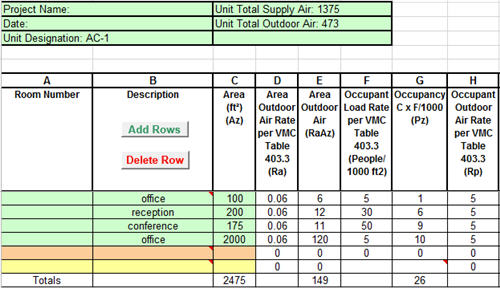
By Aaron Morgan and Jay Riat
(original publish date: July 7, 2016)
Every occupied space of a building must be ventilated naturally or mechanically. If choosing mechanical means, the minimum outdoor airflow rate of the HVAC system must be calculated in accordance to Section 403.3 of the Virginia Mechanical Code. Because the tables and formulas can be fairly complex and time consuming, the county has developed a spreadsheet/form with self-populating cells that automate the calculation. You may contact us to request a copy of the spreadsheet/form to be emailed to you.
Using the spreadsheet/form provides design compliance and consistency which will reduce mechanical review times and the overall permit process. Designers should complete and print the spreadsheet/form and attach it to each set of construction documents submitted to the county during permit application.
Helpful hints for using the spreadsheet/form:
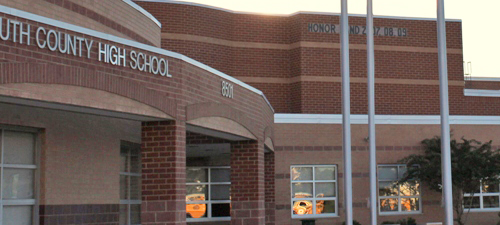
By Richard Grace
(original publish date: May 19, 2016)
Virginia Plumbing Code Section 403.1 dictates the minimum number of plumbing fixtures in a space based on its occupancy (function) and occupant load (maximum number of people). The building code requires the occupant load of the space to be calculated using its entire square footage, thus the number of required plumbing fixtures reflects the greatest possible occupant load. This is called simultaneous use.
However, there are some occupancies where the people may move from one area to another, but never fill the entire space at once. This is called non-simultaneous use, and it is most often seen in schools, Group E. Children are rarely in a classroom and auditorium at the same time, so why should unnecessary plumbing fixtures be required? Rooms such as the auditorium and gymnasium are generally for after-school activities rather than simultaneously used during school hours.
Unfortunately the code does not recognize this concept; however, Fairfax County will permit non-simultaneous use in Group E only. To determine the required number of fixtures, use the larger occupant load calculated from the following room combinations:
This is a reasonable approach that maintains the spirit and intent of the plumbing code while reducing the costs related to potential redundant fixtures.
Non-simultaneous use is permitted only with the permission of the Fairfax County Building Official through the code modification process. Learn more about code modifications and submission requirements.
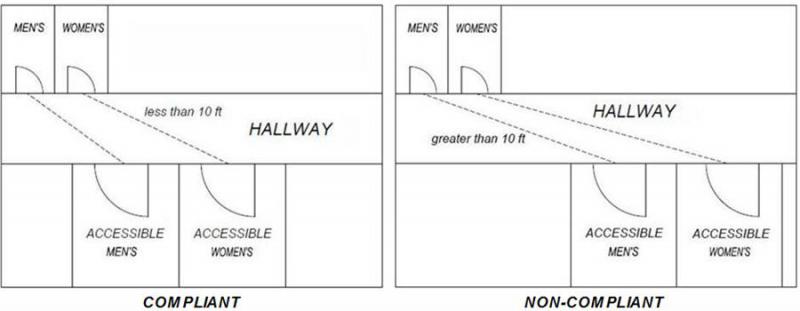
By Anurag Baral
(original publish date: Aug. 17, 2017)
If you read Section 1109.2 of the 2018 Virginia Construction Code (VCC), you are provided with location requirements for accessible restrooms. If you pay particular attention to Exception 3, you will note that while it specifies how many restrooms are to be in a cluster, it does not define the term cluster.
1109.2 Toilet and bathing facilities.
Each toilet room and bathing room shall be accessible. Where a floor level is not required to be connected by an accessible route, the only toilet rooms or bathing rooms provided within the facility shall not be located on the inaccessible floor. Except as provided for in sections 1109.2.2 through 1109.2.4, at least one of each type of fixture, element, control or dispenser in each accessible toilet room and bathing room shall be accessible.
Exceptions:
The Building Division will consider clustered toilet and bathing rooms as two or more single-occupant toilet rooms or bathing rooms, with entrance doors plainly visible from one and other, located either adjacent to each other or across the hall from each other and having a maximum travel distance of 10 feet measured from center of door to center of door of the nearest toilet/bathing room (see figures above). Please note that signage requirements of VCC Section 1111.2 still apply.
For more information, please contact Billy Farmer at 703-324-8361, TTY 711 or via email.
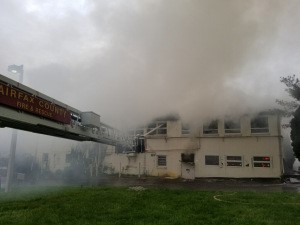
By Battalion Chief John L. Walser
While it is entirely too early to know what caused the fire at the Notre-Dame Cathedral, it is a stark reminder of the fire hazards in buildings under construction or renovation.
Several fires involving large wooden buildings under construction have occurred in recent years. However, there are fire hazards at all construction types, regardless of the type of construction materials.
Buildings under construction, or being renovated, present a higher risk to damage from fire. Significant reasons for this higher risk:
What are the best practices that can prevent, or at least minimize the damage from fire? Several considerations to protect a building under construction are:
NFPA 241, Standard for Safeguarding Construction, Alteration, and Demolition Operations provides detailed guidance on best practices that can be employed at construction sites. Compliance with this document is not optional and is a requirement in Virginia. This document provides a template to help manage and mitigate risk from fire.
These are a few of the considerations for when a building is under construction or alteration. Simple measures and adherence to safety procedures may prevent a devastating loss from fire and limit risk of injury and death to workers, civilians and firefighters.
For additional questions please contact the Fairfax County Fire Prevention Division, 703-246-4800, TTY 711.
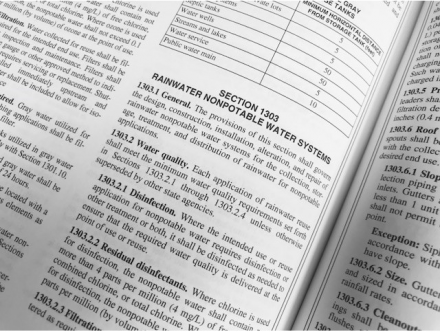
By Richard Grace
In early 2018, the Canadian Standards Association (CSA) in conjunction with the International Code Council (ICC) produced a national standard, CSA B805-18/ICC 805-2018, that could be used to assist in the design for rainwater harvesting systems. This standard has been accepted by reference in the 2021 International Plumbing Code for non-potable water system use. It provides prescriptive and performance requirements and includes provisions for multiple collection surfaces and various end uses.
For larger commercial and multifamily buildings that may have problems complying with minimum rainwater provisions in the Virginia Plumbing Code, designers may submit a request to utilize this alternative method with their proposed rainwater harvesting system. If designing to the CSA B805-18/ICC 805-2018 standard, the designer must clearly show how the proposed system complies with the requirements of the chosen compliance path defined in the standard.
New amendment to the Public Facilities Manual allows administrative waivers of previously mandatory provisions
Recently, the Fairfax County Board of Supervisors approved an amendment to the Public Facilities Manual (PFM) that provides greater flexibility during the site development review process, and allows innovative ideas to solve engineering problems without a lengthy legislative process.
Previously, if a provision in the PFM used the words “must” or “shall,” it was a mandatory minimum requirement and could not be waived. Now, if the request meets certain conditions and is not mandated by other law, the Director of Land Development Services can waive these previously mandatory provisions.
In practice, this means that county staff can use their professional judgement when the realities of a development project make it difficult to follow the PFM. This increased flexibility can help shorten the development review process and allows sensible designs to improve the finished product, while still protecting the community and the environment. This change is part of the county’s efforts to return the PFM to its original intent as a guidance document.
To take advantage of this new flexibility, the waiver request must meet the following conditions:
In addition, any waivers or alternative designs must comply with specific requirements of the Virginia Code, County Code, and other applicable regulations, such as specific standards of the Virginia Department of Transportation and other reviewing agencies, from which variances may not be granted at the local level.
To take request a waiver, customers should use the current waiver application form. More improvements to the PFM are underway through the PFM Flexibility Project.

In May 2018, Fairfax County is participating in the 38th annual Building Safety Month, a worldwide campaign presented by the International Code Council, its members and partners to promote building safety. First observed in 1980, Building Safety Month raises awareness about critical safety issues from structural to fire prevention, plumbing and mechanical systems, and energy efficiency.
Building codes and the officials who enforce them are making our families and communities safer and more resilient. Homes and buildings that are built in compliance with building safety codes result in resilient structures that minimize the risks of death, injury and property damage. In the wake of a disastrous hurricane season, rampant wildfires and devastating earthquakes, building safety is even more important. Building safety affects everyone, and modern, updated building codes save lives.
This year’s themes are:
Local events to celebrate Building Safety are being organized by the Department of Land Development Services throughout the month of May. A full agenda can be downloaded here. You can hear from one of LDS’s Building Division Supervising Combination Inspectors about the importance of Building Safety Month on this episode of the podcast Code Talk. The Fairfax County Board of Supervisors are scheduled to proclaim May as Building Safety Month on May 15.
Fairfax County Land Development Service’s Building Division has been awarded the highest achievable rating for building code effectiveness under the current Virginia Uniform Statewide Building Code.
The division has been given a 1 / 2 (commercial / residential) rating by Insurance Services Offices, Inc. (ISO) on the Building Code Effectiveness Grading Schedule (BCEGS). Working on behalf of insurance companies, ISO uses the BCEGS to evaluate a jurisdiction's current building codes and how they are enforced. The evaluations place special emphasis on mitigation of losses from fire and natural disasters.
The Building Division’s achievement is remarkable especially considering the volume of work the division handles. In fiscal year 2017, its staff reviewed nearly 25,000 building plans and conducted more than 158,000 building inspections.
A Class 2 rating is the highest achievable rating for Fairfax’s residential code enforcement because a key factor in ISO ratings for residential construction is whether sprinklers are required. The Virginia Board of Housing and Community Development does not mandate sprinklers in single family dwellings and townhouses less than four stories, and Fairfax County is not permitted to enforce a higher standard than that set by the state.
This latest ISO survey result shows an improvement in both the commercial and residential sectors. When last surveyed in 2014, Fairfax County received a Class 2 rating for building code enforcement in the commercial sector and a Class 3 for building code enforcement in the residential sector.
The high rating has positive fiscal implications for property owners, who have the potential to pay lower property insurance premiums on structures in Fairfax that receive their initial occupancy permit after this ISO classification. Insurance premiums for existing properties will not be affected.

Media Contact:
Anne Cissel
Public Information Officer
Fairfax County Land Development Services
12055 Government Center Pkwy., Suite 659
Fairfax, VA 22035
T: 703-324-2743
Anne.cissel@fairfaxcounty.gov
Fairfax County is proud to honor development projects that offer both economic development and environmental protection. The county recognized winners of the 2017 Land Conservation and Tree Preservation Awards during a public ceremony held in the Fairfax County Government Center board auditorium on January 29, 2018. The winners included land development firms that have demonstrated best practices in preserving the county’s soil and water resources and protecting trees during development projects.
The annual awards program is sponsored by two Fairfax County departments: Land Development Services and Public Works and Environmental Services, in cooperation with the Northern Virginia Soil and Water Conservation District and the Fairfax Tree Commission.
The Land Conservation Awards program was established in the early 1970s to provide an incentive for developers to reduce erosion at their construction sites and to publicly recognize erosion and sedimentation plans that are correctly implemented and maintained. Winners were selected by judges from the Northern Virginia Soil and Water Conservation District and the Virginia Department of Environmental Quality.
The Fairfax County Tree Commission celebrated the winners of the Tree Preservation Awards, which recognizes developers who preserve trees and incorporate landscaping into their sites. The top inspectors and plan reviewers from Land Development Services were also recognized.
Best practices from the winning projects were highlighted during the awards presentation.
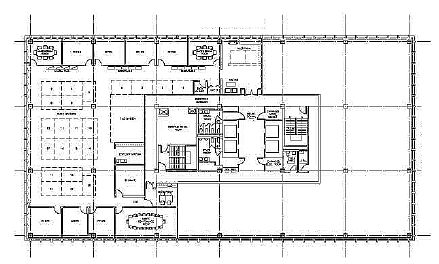
By Brian Foley
Two questions that often plague architects when designing a tenant improvement plan in an existing building are: 1) What’s the type of construction? 2) What code was the base building designed under? With regards to Question 1, the Building Division suggests the following tools:
Question 2 is easily answered if you use the USBC adoption table in the Quick Reference. Remember that a year’s grace period has been standard when adopting a new code in Virginia. Add one year to the effective date to determine the absolute adoption date of the technical provisions. Do note that during the one-year grace period, permits are able to be issued under both the incoming and outgoing codes.